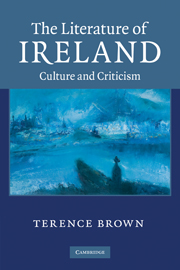Book contents
- Frontmatter
- Contents
- Acknowledgements
- Introduction
- 1 The Literary Revival: historical perspectives
- 2 Joyce's magic lantern
- 3 Music: the cultural issue
- 4 Modernism and revolution: rereading Yeats's ‘Easter 1916’
- 5 Shakespeare and the Irish self
- 6 Irish literature and the Great War
- 7 Ireland, Modernism and the 1930s
- 8 Post-modernists: Samuel Beckett and Flann O'Brien
- 9 Patrick Kavanagh: religious poet
- 10 MacNeice's Irelands: MacNeice's islands
- 11 Louis MacNeice and the Second World War
- 12 MacNeice and the puritan tradition
- 13 John Hewitt and memory: a reflection
- 14 Michael Longley and the Irish poetic tradition
- 15 Seamus Heaney: the witnessing eye and the speaking tongue
- 16 Derek Mahon: the poet and painting
- 17 Telling tales: Kennelly's Cromwell and Muldoon's ‘The More a Man Has the More a Man Wants’
- 18 Redeeming the time: John McGahern and John Banville
- 19 ‘Have we a context?’: transition, self and society in the theatre of Brian Friel
- 20 Hubert Butler and nationalism
- 21 The Irish Dylan Thomas: versions and influences
- Index
- References
4 - Modernism and revolution: rereading Yeats's ‘Easter 1916’
Published online by Cambridge University Press: 05 June 2012
- Frontmatter
- Contents
- Acknowledgements
- Introduction
- 1 The Literary Revival: historical perspectives
- 2 Joyce's magic lantern
- 3 Music: the cultural issue
- 4 Modernism and revolution: rereading Yeats's ‘Easter 1916’
- 5 Shakespeare and the Irish self
- 6 Irish literature and the Great War
- 7 Ireland, Modernism and the 1930s
- 8 Post-modernists: Samuel Beckett and Flann O'Brien
- 9 Patrick Kavanagh: religious poet
- 10 MacNeice's Irelands: MacNeice's islands
- 11 Louis MacNeice and the Second World War
- 12 MacNeice and the puritan tradition
- 13 John Hewitt and memory: a reflection
- 14 Michael Longley and the Irish poetic tradition
- 15 Seamus Heaney: the witnessing eye and the speaking tongue
- 16 Derek Mahon: the poet and painting
- 17 Telling tales: Kennelly's Cromwell and Muldoon's ‘The More a Man Has the More a Man Wants’
- 18 Redeeming the time: John McGahern and John Banville
- 19 ‘Have we a context?’: transition, self and society in the theatre of Brian Friel
- 20 Hubert Butler and nationalism
- 21 The Irish Dylan Thomas: versions and influences
- Index
- References
Summary
It is a commonplace of literary history to observe that what came to be known as the literary Modernism of the second two decades of the twentieth century was a reactive response to the disturbed, war-torn and revolutionary conditions of modernity itself. A familiar text can be cited to indicate how this association between a troubled period and radical aesthetic experiment was established even as the texts of high Modernism were appearing and receiving their earliest assessments. In T. S. Eliot's famous 1923 Dial review of Joyce's Ulysses, which had appeared in 1922, the same year that Eliot himself had published The Waste Land, the poet/critic argued that Joyce had employed a mythical method in his epic novel ‘as a way of controlling, of ordering, of giving a shape and a significance to the immense panorama of futility and anarchy which is contemporary civilization’. He had assumed, wrongly to my mind, that Joyce was reacting to the same conditions of post-war, post-revolutionary ennui and angst that he himself had so hauntingly evoked in The Waste Land in such sections as ‘The Burial of the Dead’, with its montage of déraciné central Europeans in the Hofgarten, or going south in the winter, its desolating love affair conducted to the strains of Wagnerian commentary and its underlying mythic allusiveness. Interestingly, for my purposes in this essay, Eliot in that review also suggests that this mythic method had been first employed by W. B. Yeats, thereby drawing the Irish poet for his own critical purposes (the justification of his own work) within the circle of literary experimentalists who were presumably reacting to the general crisis.
- Type
- Chapter
- Information
- The Literature of IrelandCulture and Criticism, pp. 45 - 60Publisher: Cambridge University PressPrint publication year: 2010

